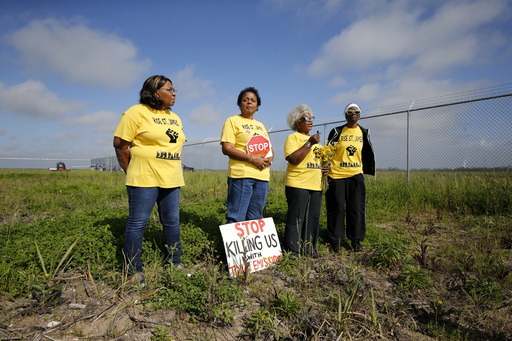A federal appellate court in New Orleans is scheduled to hear oral arguments on Monday regarding a civil rights case alleging that St. James Parish in south Louisiana implemented discriminatory land-use policies that led to the placement of polluting industries in predominantly Black communities. The lawsuit claims that the parish favored white neighborhoods by shielding them from industrial development while exposing Black neighborhoods to environmental harm. Community groups including Inclusive Louisiana, Rise St. James, and Mt. Triumph Baptist Church are pushing for a stop to future industrial expansions in the parish.
According to the plaintiffs, when they filed the complaint in March 2023, 20 out of 24 industrial facilities were concentrated in areas with majority Black populations within St. James Parish. This parish sits in the Chemical Corridor along the Mississippi River, known as “Cancer Alley” due to high levels of suspected cancer-causing pollution emitted by industrial facilities in the region.
The lawsuit coincides with recent efforts by the federal government, under the Biden administration, to address environmental racism. Stricter environmental protections have been proposed, and significant funding commitments have been made to tackle environmental justice issues.
In a prior ruling, U.S. District Judge Carl Barbier dismissed the lawsuit primarily on procedural grounds, stating that the claim was filed too late. However, he acknowledged the validity of the plaintiffs’ concerns, particularly regarding the parish’s 2014 land-use plan, which appeared to provide preferential treatment to white neighborhoods over Black communities in terms of industrial development.
The plaintiffs are being represented by lawyers from the Center for Constitutional Rights who argue that ongoing discrimination against Black residents in the parish persists, allowing for the continued expansion of industrial facilities in predominantly Black areas. The lawsuit also touches on the failure of the parish to protect burial sites of enslaved people from industrial development, denying descendants of slaves the opportunity to memorialize these sites.
On the other hand, attorneys for St. James Parish dismiss the lawsuit’s claims as exaggerated and “inflammatory rhetoric.” Despite requests for comments, St. James Parish has not responded.
Local resident Gail LeBoeuf, a plaintiff in the case, emphasized the long-standing environmental injustices faced by Black communities in St. James Parish. Living near an alumina plant for years, LeBoeuf believes her cancer diagnosis is linked to industrial pollution exposure, though the exact cause cannot be definitively proven. She points to a 2003 EPA report noting above-average cancer deaths in St. James Parish.
The lawsuit and advocacy efforts by community groups like Inclusive Louisiana also challenge the construction of a massive plastics plant by a Taiwanese company near a predominantly Black town in the parish. LeBoeuf and other environmental activists have engaged with White House officials to address concerns raised by UN human rights experts over industrial expansion in the region.
In her pursuit of environmental justice, LeBoeuf sees both her advocacy and chemotherapy treatment as vital forms of medicine for her community and herself. She rescheduled a doctor’s appointment to meet with White House officials, underscoring the urgency of her mission.


